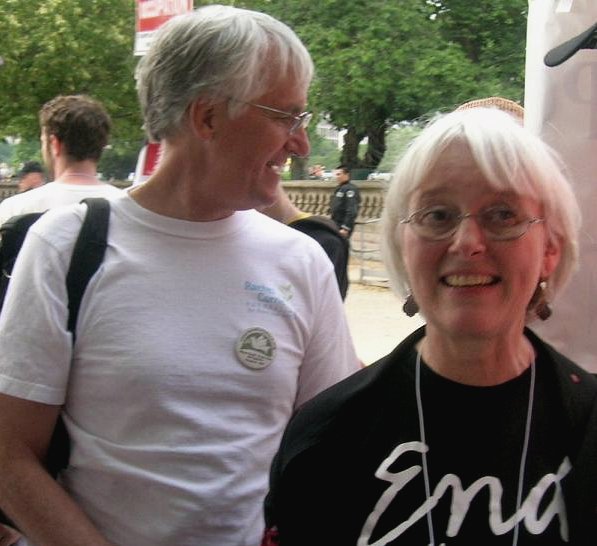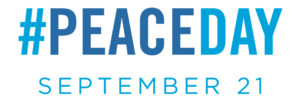Five Questions For: Rachel Corrie’s Parents
April 11, 2018

Craig and Cindy Corrie.
Last month marked the 15th anniversary of the death of Rachel Corrie, a young American peace activist killed in 2003 by an Israeli soldier-driven bulldozer as she tried to stop the demolition of a Palestinian family home in Gaza. Since then, her parents Craig and Cindy have carried on her work through the Rachel Corrie Foundation for Peace and Justice. They paid us a visit with fellow peace activists American Joe Catron and Palestinian Islam Maraqa, who, like Rachel Corrie before her death, work with the International Solidarity Movement.
Q: How does it feel to see the news out of Gaza now at the fifteen-year anniversary of Rachel’s death?
Craig Corrie: It seems to me, particularly when I’m watching from here in the West, that nobody pays any attention to Gaza. Which is why our daughter went there.
Cindy Corrie: Fifteen years is a long time. What Rachel would want us to be asking is, “what do we need to do to support this?” To have more than 20,000 Gazans standing on that border risking what they’re risking and yet doing it joyfully—I think we’re compelled to really listen and to really engage.
Q: After the judge cleared the Israeli military of any wrongdoing in Rachel’s case, you were told “There’s no such thing as civilians in Gaza.” Today, we have high-ranking Israeli official Avigdor Lieberman saying “There’s no innocent people in Gaza.” How does that strike you?
Craig Corrie: It’s a war crime! He’s admitting to a war crime. Let’s not forget that. As a family we’ve tried to hold them as accountable as we could.
Cindy Corrie: There’s nothing here that surprises us. In the court case it became very clear that Israeli soldiers in Gaza in 2003 never expected to testify in a courtroom and be held accountable.
The person who was in charge of Southern Gaza when Rachel was killed by the bulldozer, [Colonel Pinhas (Pinky) Zuaretz], testified in our case. When he was asked what happened to Rachel, he said, “I think a wall fell on her.”
Q: What is different in Gaza today?
Joe Catron: Israel is openly admitting to the massacre of unarmed demonstrators. They’re not trying to obscure it or shuffle the blame onto individual actors as they’ve done in cases like Rachel’s death.They’re claiming it, they’re proud of it. This is something of a tipping point for us here.
Trump’s recognition of Jerusalem completely discards the idea that the United States can be any kind of an honest broker in this situation.
Q: Has Trump changed things?
Cindy Corrie: With Trump’s recognition of Jerusalem, moving the U.S. Embassy—I don’t think people in the United States even understand how the rest of the world views that as an outrageous, unacceptable step. It completely discards the idea that the United States can be any kind of an honest broker in this situation.
Islam Maraqa: As Palestinians, we never saw the difference between the American presidents. All the time, the only thing we hear on the news from any American president is], “Israel has the right to defend itself. Israel has the right to defend itself.” And what about the Palestinians? Unfortunately, the Americans are most of the time adopting the Israeli narrative, and supporting everything possible.
Q: What should people here in the United States do to educate themselves about this struggle?
Cindy Corrie: People are always calling for Palestinians to behave nonviolently. If we’re not standing with them, and ensuring that there’s some positive result from this, then I think we set up an even more dangerous situation.
The anti-BDS work going on has provided us a window into our state legislatures and Israeli influence there. It’s an opportunity to do some work there too, to say, “there’s a piece of this you need to know more about.”
Craig Corrie: The obvious tie is the training of our police forces in the United States by the Israelis. We should be working to make sure that our police forces are not trained by people who view whomever they meet on the street as a foreign entity. That’s one of the places where this ties together with Black Lives Matter. It all is in the same room.
Alexandra Tempus is associate editor of The Progressive.







